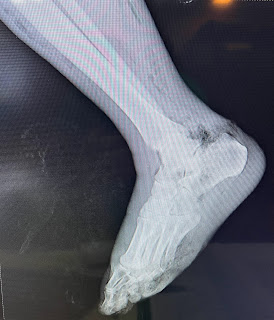Unbroken
As a physician, I encounter a fair share of brokenness in everyday work: torn skin, severed bones, ruptured organs, defective bodily functions, fragmented families and disruptive social situations, and overwhelmed and dejected spirits. Just in this past week, I have had to staple a child's scalp back together, put a woman's broken arm in a cast, refer someone with ruptured eardrums to our visiting Ear, Nose, and Throat (ENT) specialist, stop a woman from severe hemorrhage after giving birth, report a case of underage rape to local authorities, start antipsychotic medication for a woman suffering from anorexia and major depression during the first trimester of pregnancy, and counsel a worried young woman with pre-cancerous changes in her cervix who was incorrectly informed she needed her uterus removed. Amidst all of the brokenness of this world and our humanity it can sometimes be difficult to focus on anything else. However, in every situation of brokenness, I have recognized that there also exists that which is unbroken. Oftentimes, it requires an act of the will to "break" the chains of overwhelming brokenness, freeing us to see that which is beautifully unbroken.
I recently watched Unbroken, a movie about a US Olympian and Army officer turned prisoner of war during World War II. This movie recounts the real-life story of Louis Zamperini who survives a plane crash, forty-seven days floating on a raft in the open ocean, and imprisonment in a brutal Japanese POW camp. By the end of the movie, the reason for its title becomes abundantly clear as Louis proves to be unbroken by all that life throws at him and every attempt to strip him of his faith and dignity. Despite every effort of brokenness staring him in the eye- a stolen Olympic career, separation from his family, debilitating hunger, senseless torture from a Japanese war criminal- he emerges unbroken. Though it might have been easier to jump off the raft into the ocean or drop to the ground in defeat with a heavy plank on his back, Louis is steadfast. In the end, he credits his unbrokenness to his faith in God.
Broken or Unbroken?
There is a well-known saying in the medical field: "A good surgeon knows how to operate, a better surgeon when to operate, and the best surgeon when not to operate." Its implications are far-reaching beyond surgery- in every aspect of healthcare it is equally, if not more, important to know when not to intervene as it is to intervene. Inherent in this wisdom is the ability to discern that which is broken from that which is unbroken- only then, does it become clear how to best care for the patient in front of you.
Sometimes, broken and unbroken are easily distinguishable: the patient with ruptured eardrums who needs a reconstructive surgery to restore function. Other times, it is more complex, and the brokenness becomes clear only when treating what one thought was broken ultimately fails to address the problem: the woman I thought had a normal bout of nausea and vomiting of pregnancy who in reality suffers from major depression and disordered eating. And other times, by intervening on something that is unbroken, the brokenness remains or something new is broken in turn: the young woman desiring children who was advised to have her uterus removed for pre-cancerous changes in her cervix that can instead undergo a simple operation of the affected cervical tissue, thus preserving her fertility.
Sadly, it is not uncommon here in Honduras for many local physicians to offer and recommend therapies or interventions that are not indicated and potentially harmful to patients. This is not to say that I, too, haven't been guilty of this mistake on occasion, but I am continually grateful for the training I received in the US that, with some exceptions, mostly strives to uphold human dignity and the premise to "do no harm." Here, I have seen a handful of patients on potentially dangerous medications without an appropriate indication, others suffering debilitating side effects from inappropriately-used medications, and others suffering from complications of surgery for problems that could have been treated without surgery or would have been better left alone. Though many of these patients suffer at the hands of a lack of adequate medical training and a lack of appropriate legal safeguards for inappropriate care, many also fall victim to the motivation of selfishness and greed. A Honduran physician can earn more money by performing a C-section instead of a vaginal delivery, convincing a woman that a C-section is needed without an appropriate indication. For others, it is more profitable to perform surgery on a person despite not having the right equipment and resources than to honestly inform the patient that there is no way to adequately fix his or her problem. Clearly, this broken system poses a bigger challenge than can be solved by a small team of healthcare personnel in rural Honduras. At a minimum, I hope Hospital Loma de Luz can serve as a role model for others in preserving that which is unbroken.
Providence.
An older man walks in with severe abdominal pain- his bladder is distended as a result of the uninhibited growth of his prostate gland. He requires a urinary catheter because he cannot drain his bladder on his own. Only a few days ago the visiting Urologist arrived- one quick operation later, the patient is now able to empty his bladder without difficulty and return to his normal daily functioning.
A young man presents to the Emergency Room with broken fingers and severed tendons after a motorcycle accident. After being informed by three outside hospitals that there was nothing they could do to save his hand function, his family brings him to Loma de Luz. Only a few days ago the visiting Orthopedic Surgeon who specializes in hand surgery arrived- another quick operation later, the patient has restored function to his hand.
An older woman is assisted by her family into my clinic office- she has been suffering from debilitating vision loss due to cataracts. Only a few days ago the visiting Ophthalmologist arrived- and yet another operation later, the patient can now see clearly again.
A young boy comes to the Emergency Room after falling and splitting his tongue open. Only a few days ago the visiting ENT surgeon arrived- and one more operation later, the child's tongue is whole again.
I've begun to notice a trend here at Loma de Luz. It appears that whenever one of our visiting specialists arrives, a patient in need of his or her services also finds their way to the hospital at an opportune time. Some may attribute this phenomenon to luck, but luck is fickle- I prefer to attribute it to providence.
***
If you ask Merriam-Webster for the definition of the word "unbroken," it defines it, like most words of the English language, with a multitude of other words and descriptions: whole and intact, continuous, unsubdued. When a patient is sitting in front of me amidst a sea of brokenness and I, too, find myself lost at sea, I remember that God's design and providence is the only thing unbroken- always whole and intact, continuous, and unsubdued. I have confidence that He will continue to guide all of us to heal what is broken and preserve that which is unbroken.
Meanwhile, I ventured to ride a scooter for the first time the other day. I am planning to remain "unbroken" by staying off the dangerous roads where many motorcycle accidents occur here.






Wise thoughts my friend
ReplyDelete